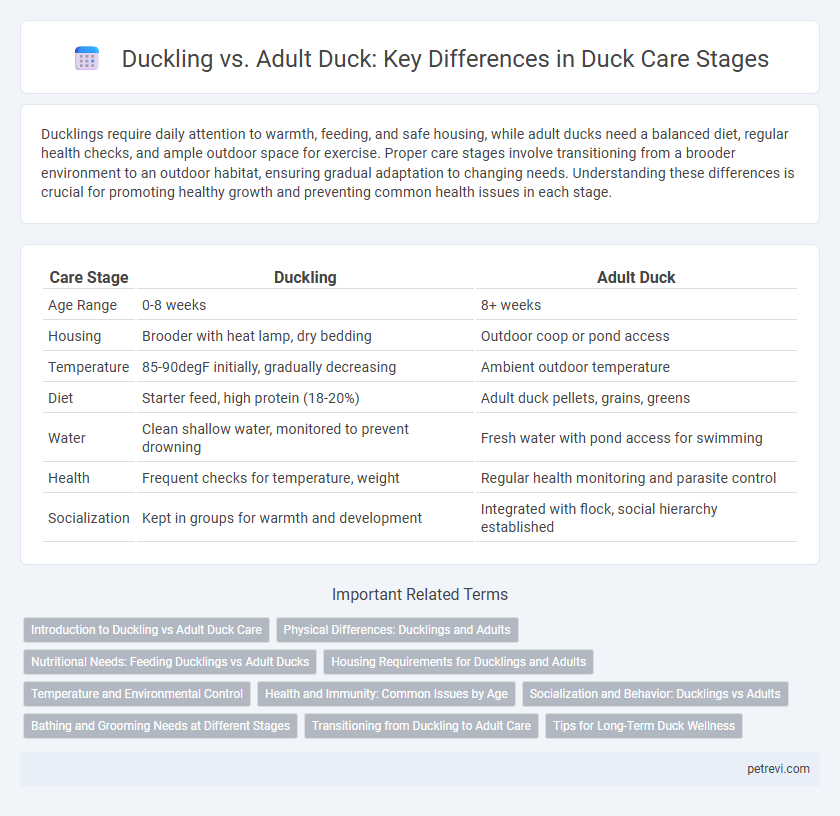Ducklings require daily attention to warmth, feeding, and safe housing, while adult ducks need a balanced diet, regular health checks, and ample outdoor space for exercise. Proper care stages involve transitioning from a brooder environment to an outdoor habitat, ensuring gradual adaptation to changing needs. Understanding these differences is crucial for promoting healthy growth and preventing common health issues in each stage.
Table of Comparison
| Care Stage | Duckling | Adult Duck |
|---|---|---|
| Age Range | 0-8 weeks | 8+ weeks |
| Housing | Brooder with heat lamp, dry bedding | Outdoor coop or pond access |
| Temperature | 85-90degF initially, gradually decreasing | Ambient outdoor temperature |
| Diet | Starter feed, high protein (18-20%) | Adult duck pellets, grains, greens |
| Water | Clean shallow water, monitored to prevent drowning | Fresh water with pond access for swimming |
| Health | Frequent checks for temperature, weight | Regular health monitoring and parasite control |
| Socialization | Kept in groups for warmth and development | Integrated with flock, social hierarchy established |
Introduction to Duckling vs Adult Duck Care
Duckling care requires careful temperature regulation, frequent feeding with nutritionally balanced starter feed, and close monitoring for health signs, unlike adult ducks that need a diet rich in grains and greens with access to open water for swimming. Adult ducks demand a secure, spacious environment with proper shelter from predators and seasonal weather, while ducklings thrive in brooder boxes with heat lamps and soft bedding for comfort. Understanding the distinct nutritional and environmental needs at each growth stage ensures optimal development and well-being of ducks.
Physical Differences: Ducklings and Adults
Ducklings have soft, downy feathers that provide insulation but lack waterproofing, while adult ducks develop waterproof, fully formed feathers suitable for swimming and protection from the elements. Physically, ducklings are smaller with proportionally larger heads and eyes, enabling sharp vision for survival, whereas adults feature stronger wings for flight and a more robust body structure. The transition from duckling to adult includes significant changes in feather texture, coloration, and overall size, which are critical markers in duck care stages.
Nutritional Needs: Feeding Ducklings vs Adult Ducks
Ducklings require a high-protein starter feed containing 18-20% protein to support rapid growth and development, while adult ducks need a balanced diet with 16-18% protein to maintain health and egg production. Fresh water must always be accessible, with ducklings needing smaller, frequent feedings to prevent choking and adults consuming larger quantities less often. Nutritional supplements like niacin are crucial for ducklings to prevent leg deformities, whereas adult ducks benefit from calcium-rich feeds to support strong eggshell formation.
Housing Requirements for Ducklings and Adults
Ducklings require warm, draft-free housing with a brooder temperature starting around 90degF, gradually decreasing as they grow, while adult ducks need spacious, secure outdoor shelters with proper ventilation and protection from predators. Bedding for ducklings should be absorbent and changed frequently to maintain hygiene, whereas adults benefit from straw or wood shavings that provide comfort and insulation. Access to clean water sources is critical in both stages, but ducklings need shallow water containers to prevent drowning, contrasting with adults who require larger water areas for swimming and preening.
Temperature and Environmental Control
Ducklings require a consistently warm environment with temperatures around 90degF (32degC) during their first week, gradually decreasing by 5degF each week until reaching ambient conditions. Proper humidity and clean, draft-free housing are essential to prevent chilling and respiratory issues. Adult ducks thrive in moderate temperatures, typically 65-75degF (18-24degC), needing access to shaded areas and well-ventilated shelters to maintain optimal health.
Health and Immunity: Common Issues by Age
Ducklings require intensive care to support developing immunity, facing common issues like respiratory infections and yolk sac infections, which demand vigilant monitoring and prompt treatment. Adult ducks generally have stronger immune systems but are susceptible to parasites, such as lice and intestinal worms, and chronic respiratory conditions that require regular health checks and preventive measures. Maintaining age-specific health protocols enhances overall duck welfare and reduces mortality rates throughout different care stages.
Socialization and Behavior: Ducklings vs Adults
Ducklings require intensive socialization during the first few weeks to develop strong bonds and reduce stress, often benefiting from gentle handling and exposure to their environment. In contrast, adult ducks exhibit established social hierarchies and behaviors, requiring less frequent intervention but still need enrichment to prevent boredom and aggression. Understanding these behavioral differences is crucial for effective duck care and ensuring harmonious group dynamics throughout their life stages.
Bathing and Grooming Needs at Different Stages
Ducklings require gentle, warm water baths to avoid chilling and soft brushes to help them develop healthy feathers without stress, while adult ducks need more routine bathing in cooler water to maintain feather condition and waterproofing. Frequent grooming during the duckling stage supports feather growth and cleanliness, whereas adult ducks benefit from regular preening encouragement to control feather mites and maintain insulation. Proper hydration and environmental temperature during these care stages are critical to preventing illness and promoting optimal feather development.
Transitioning from Duckling to Adult Care
Transitioning from duckling to adult care involves gradually adjusting diet from high-protein starter feed to balanced adult pellets to support healthy growth and development. Housing requirements shift from warm, secure brooders to outdoor coops with ample space and protection from predators. Water access should include shallow baths for ducklings evolving into deeper pools suitable for adult ducks to ensure proper hydration and feather maintenance.
Tips for Long-Term Duck Wellness
Ducklings require constant warmth, specialized feed rich in protein, and secure housing to support early growth and immune development. Adult ducks benefit from a balanced diet including grains, fresh vegetables, and access to clean water to maintain hydration and feather health. Regular health checks, parasite control, and adequate space for swimming contribute significantly to long-term duck wellness across both stages.
Duckling vs Adult for Duck Care Stages Infographic

 petrevi.com
petrevi.com